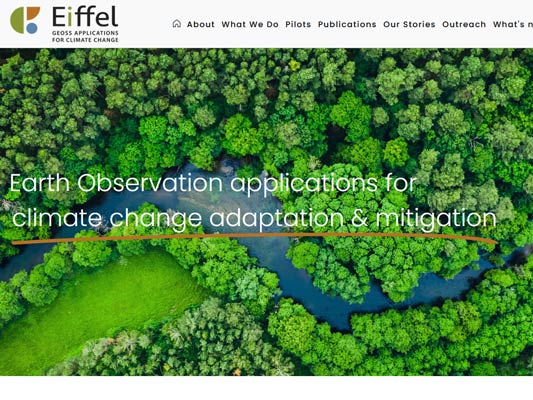The EIFFEL project (Revealing the Role of GEOSS as the Default Digital Portal for Building Climate Change Adaptation and Mitigation Applications) will offer the Earth-Observations (EO) community the ground-breaking capacity of exploiting existing GEOSS and external datasets and build upon prior knowledge, with minimal new data collection activities. Added-value services interoperable with GEOSS will be designed, using cognitive search and metadata augmentation tools based on Artificial Intelligence (AI), including Natural Language Processing. These tools will leverage advanced cognitive features to extract meaningful information from and enrich GEOSS metadata.
Moreover, novel methods (super resolution, data fusion) for augmenting the spatiotemporal resolution of explored EO data will be proposed, in order to address the needs of the diverse EIFFEL Climate Change adaptation and mitigation applications. The latter will cover: (i) a set of five different GEO Societal Benefit Areas (SBAs), namely in Water and Land Use Management, Sustainable Agriculture, Transport Management, Sustainable Urban Development and Disaster Resilience domains; (ii) various EU geographical and climatic regions, at local, regional, national, cross-border and pan-European scales. Further, the value of using explainable AI techniques for improving the credibility and comprehensiveness of such Climate Change applications, so that they can offer actionable insights to the decision makers, will be showcased.
EIFFEL will foster the co-design of Climate Change adaptation policies and mitigation strategies and monitor Climate Change effects in the respective regions. The project, in line with EuroGEO’s emphasis on early engagement with stakeholders and their participation in the application design, has ensured that they are active consortium members. EIFFEL complies with the framework of results-Oriented GEOSS, to improve the delivery of applications tailored to decision making centres and will actively participate in the GEO Work Programme post-2019. Last, it provides tangible proof of the value of GEOSS data for creating Climate Change applications and encourages projects and initiatives to offer their data through the portal.
PMOD/WRC Involvement
Photovoltaic penetration in urban areas: The solar energy system SENSE, developed through national (Aristotelis-Solar) and EU projects (GEO-CRADLE, e-shape) and applied at high resolution for the Attica region in SMURBS, will be used to assess the penetration of rooftop PV (photovoltaic) systems in urban areas.
SENSE combines AI and high performance computing with CAMS solar and aerosol products and PV characteristics, to derive the energy potential of the region. Cadastral archives, inclination and orientation aspects and shadowing effects, will be used to calculate the solar energy availability at a building and neighbourhood level. A pilot study will be performed for the LAU of interest.
Results will include the assessment of the carbon footprint reduction potential and estimation of the abatement of GHG emissions. The final product will be a detailed solar database and an interactive interface including: a) solar availability for a choice of PV orientations, available surface areas and PV materials, and b) a building scale database and interactive map of the LAU, providing the energy potential of the specific area.

